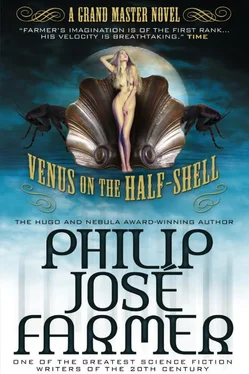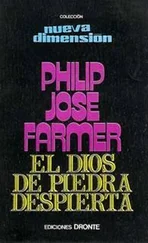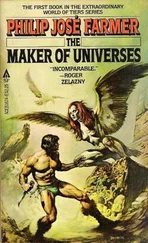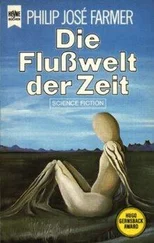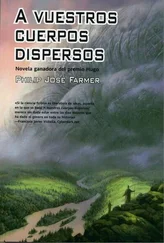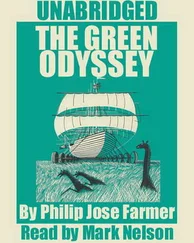Eliot Rosewater, coming out of a mental fog in a sanitarium, sees Trout for the first time. He looks to him like a kindly country undertaker. Trout no longer has a beard; he’s shaved it off so he can get a job.
Billy Pilgrim, in Slaughterhouse-Five , is introduced to Trout’s works by Eliot Rosewater, his wardmate in a veterans’ hospital near Lake Placid, New York. This was in the spring of 1948. In 1964 or thereabouts, Billy Pilgrim runs into Kilgore Trout in Ilium, New York. Trout has a paranoid face, that of a cracked Messiah, and he looks like a prisoner of war, but he has a saving grace, a deep rich voice. He is, as usual, living friendless and despised in a basement. He is barely making a living as a circulation manager for the Ilium Gazette . Cowardly and dangerous, he succeeds in his job only by bullying and cheating the boys who carry the papers. He is astonished and gratified that anyone knows of him. He goes to Pilgrim’s engagement party, where he is lionized for the first time in his life.
In 1972, according to Breakfast of Champions, Trout is snaggletoothed and has long, tangled, uncombed white hair. He hasn’t used a toothbrush for years. His legs are pale, skinny, hairless, and studded with varicose veins. He has sensitive artist’s feet, blue from bad circulation. He doesn’t wash very often. Vonnegut gives a number of physical statistics about Trout, including the fact that his penis, when erect, is seven inches long but only one and one-fourth of an inch in diameter. Just how he found this out, Vonnegut does not say.
In God Bless You, Mr. Rosewater , Mushari, a sinister lawyer (or is the adjective a redundancy?), investigates Trout. He is not interested in him as a literary phenomenon. Trout is Rosewater’s favorite author, and Mushari is checking out Trout’s works for his dossier on Rosewater. He hopes to prove that Rosewater is mentally incompetent and unable to administrate the millions of the Rosewater Foundation. No reputable bookseller has ever heard of Trout. But he does locate all of Trout’s eighty-seven novels, in a tattered secondhand condition, in a hole-in-the-wall which sells the hardest of hardcore pornography. Trout’s 2BR02B, which Eliot thought was his greatest work, was published at twenty-five cents a copy. Now it costs five dollars.
2BR02B has become a collector’s item, not because of its literary worth but because of the highly erotic illustrations. This is the fate of many of Trout’s books. In Breakfast of Champions we find that his best distributed book, Plague on Wheels, brings twelve dollars a copy because of its cover art, which depicts fellatio.
The irony of this is that few of Trout’s books have any erotic content. Only one has a major female character, and she was a rabbit (The Smart Bunny).
Trout only wrote one purposely “dirty” book in his life, The Son of Jimmy Valentine, and he did this because his second wife, Darlene, said that that was the only way for him to make money.
This book did make money but not for Trout. Its publisher, World Classics Library, a hardcore Los Angeles outfit, sent none of the royalties due to Trout. World Classics Library issued many of Trout’s books, not because the readers were interested in the texts but because they needed his books to fill out their quota. They illustrated them with art that had nothing whatsoever to do with the story, and they often changed Trout’s titles to something more appealing to their peculiar type of reader. Pan-Galactic Straw-boss, for instance, was published as Mouth Crazy.
Vonnegut says that Trout was cheated by his publishers, but Breakfast of Champions reveals that Trout’s poverty and obscurity was largely his own fault. He sent his manuscripts to publishers whose addresses he found in magazines whose main market was would-be writers. He never inquired into their reputation or the type of literature they published. Moreover, he frequently sent his stories without a stamped, self-addressed return envelope or without his own address. When he made one of his frequent moves, he never left a forwarding address at the post office. Even if his publishers had wished to deal fairly with him, they could not have located him.
Actually, Trout was a prime example of the highly neurotic writer whose creativity is compulsive and who could care less for the fate of his stories once they’d been set down on paper. He did not even own a copy of any of his own works.
Vonnegut calls Trout a science fiction writer, but he was one only in a special sense. He knew little of science and was indifferent to technical details. Vonnegut claims that most science fiction writers lack a knowledge of science. Perhaps this is so, but Vonnegut, who has a knowledge of science, ignores it in his fiction. Like Trout, he deals in time warps, extrasensory perception, space-flight, robots, and extraterrestrials. The truth is that Trout, like Vonnegut and Ray Bradbury and many others, writes parables. These are set in frames which have become called, for no good reason, science fiction. A better generic term would be “future fairy tales.” And even this is objectionable, since many science fiction stories take place in the present or the past, far and near. Anyway, the better writers spend most of their time trying to escape any labels whatsoever.
In fact, there is a lot of Kilgore Trout in science fiction writers, including Vonnegut. If I did not know that Trout was a living person, I’d think he was an archetype plucked by Vonnegut out of his unconscious or the collective unconscious of science fiction writers. He’s miserable, he wrestles with concepts and themes that only a genius could pin to the mat (and very few are geniuses), he feels that he is ignored and despised, he knows that the society in which he is forced to live could be a much better one, and, no matter how gregarious he seems to be, he is a loner, a monad. He may be rich and famous (and some science fiction authors are), but he is essentially that person described in the previous sentence. Millions may admire him, but he knows that the universe is totally unconscious of him and that he is a spark fading out in the blackness of eternity and infinity. But he has an untrammeled imagination, and while his spark is still glowing, he can defeat time and space. His stories are his weapons, and, poor as they may be, they are better than none. As Eliot Rosewater says, the mainstream writers, narrators of the mundane, are “sparrowfarts.” But the science fiction writer is a god. At least, that is what he secretly believes.
Trout’s favorite formula is to describe a hideous society, much like our own, and then, toward the end of the book, outline ways in which the society may be improved. In his 2BR02B, he shows an America which is so highly cybernated that only people with three or more Ph.D.’s can get jobs. There are also Ethical Suicide Parlors where useless people volunteer for euthanasia. 2BR02B sounds like a combination of Vonnegut’s novel, Player Piano , and his short story, “Welcome to the Monkey House.” I’m not accusing Vonnegut of plagiarism, but Vonnegut does think highly enough of Trout’s plots to borrow some now and then. Trout’s The Big Board is about a man and a woman abducted and put on display by the extraterrestrials of the planet Zircon-212. Vonnegut’s Slaughterhouse-Five tells how the Tralfamadorians carried off Billy Pilgrim and the movie star, Montana Wildhack, and put them in a luxurious cage.
It may be that Trout gave Vonnegut permission to adapt some of his plots. At one time Trout lived in Hyannis, Massachusetts, which is very near West Barnstable, where Vonnegut also lived.
Vonnegut admires Trout’s ideas, though he condemns his prose. It is atrocious and Trout’s unpopularity is deserved. (By the way, I’d characterize Vonnegut’s own prose, and his philosophy, as by Sterne out of Smollett.) A specimen of Trout’s prose, taken from Venus on the Half-Shell , sounds like that of the typical hack semipornographer’s. Most of the science fiction writers, according to Eliot Rosewater, have a style no better than Trout’s. But this doesn’t matter. Science fiction writers are poets with a sort of radar which detects only the meaningful in this world. They don’t write of the trivial; their concerns are the really big issues: galaxies, eternity, and the fate of all of us. And Trout is looking for the answer to the question that so sorely troubles Eliot Rosewater (and many of us). That is, how do you love people who have no use? How do you love the unlovable?
Читать дальше
